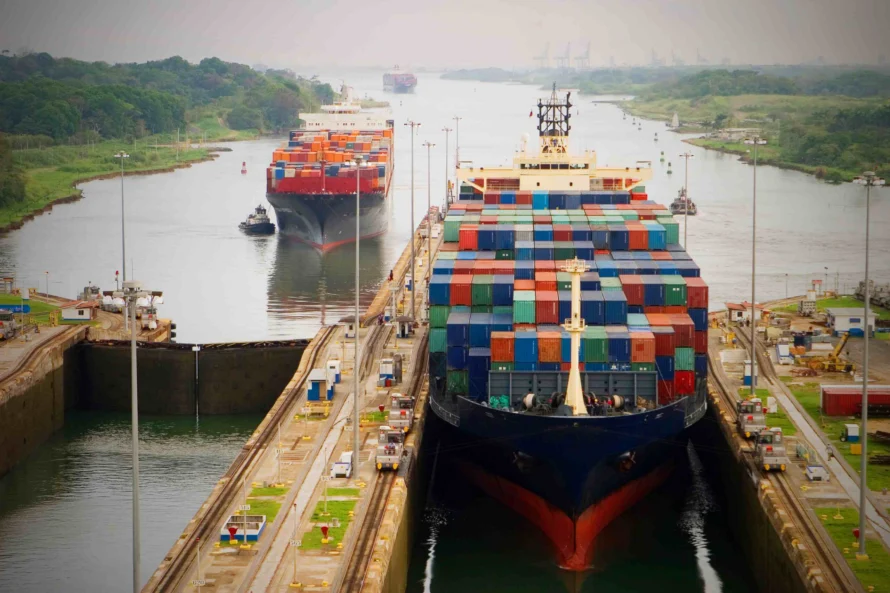Unleashing Efficiency and Eliminating Stockouts with AI and Decision Intelligence

“Beware of little expenses; a small leak will sink a great ship.” – Benjamin Franklin
Every year, $9 trillion worth of cargo transits the Panama canal on cargo ships, connecting companies and consumers with global markets. Until recently, up to 40 ships per day could pass through the canal, significantly cutting time and cost for companies to deliver their products.
But due to a severe drought in Panama, water levels have fallen so dramatically that the Panama Canal Authority has cut the number of daily slots from 32 at the beginning of November 2023 to 24 in December 2023. That number will drop to 18 by February 1, 2024.
This sharp decline in capacity translates to a staggering increase in wait times for ships. Instead of a one-to-three-day transit, vessels are now idling for an average of nine days before they can navigate the canal – a timeline similar to the alternative route around South America.
As the number of transits is further reduced, the possibility of a 25-day wait time looms on the horizon. The catastrophic effects of such a bottleneck would severely impact global shipping networks, reminiscent of the havoc wreaked by the MV Ever Given blockage in the Suez Canal in 2021: losses in the billions of dollars, and extended delays for products with no respite until at least the second half of 2024.
This ripple effect is set to cascade through supply chains and unravel companies’ forecasted demand plans. Without timely intervention, the ensuing delays will severely impact revenue in the coming year. There is an immediate and critical need for strategic mitigation measures to address this potential challenge.
How to Chart A New Course
There are always alternatives to any supply chain operation, from demand and supply planning to last-mile delivery. Yet with the large number of variables, each carrying a different weight of impact, which variant is the most optimal for the new plan? More importantly, which overall in-time plan is the best?
Historically, supply chain teams would rely on intuition – best-case options that were based on limited data from siloed systems – to remedy the disruption. However, without a holistic view incorporating the granular impacts of each node in the supply chain, it is hard to determine what the financial repercussions really were.
For example, if a product were to be offloaded from a ship to a truck, transported across Panama, and reloaded onto a ship to continue the journey, there would be little understanding of the real additional costs, such as new transport costs and regulations, goods damaged in transit, overtime for labor, and financial levies issued by the retailer or DC. So, while these “blind” plans could predict that the product would arrive within a window, it was never clear if the new plan was actually the right decision.
Achieving Efficient Shipping and Stockout Prevention
Unexpected disruptions like these increase the level of risk involved in logistics and inventory planning. Traditional solutions such as APS or TMS systems provide notifications, but fall short of delivering truly holistic views and executable recommendations.
Today’s AI solutions for Decision Intelligence offer the ability to learn from decisions and close the loop effectively, focusing not only on order fulfillment, but on selecting the best options among a range of possibilities:
- Will a change in shipment mode expedite availability?
- Will delaying a shipment create any availability risk?
- Which shipments can be consolidated to increase loadability?
- What is the trade-off between expedited shipments and revenue impact?
Moreover, you need a solution with the ability to write back the selected decision into relevant systems of record, closing the loop by learning from the outcome of the decision. This critical step enables confidence scoring for future recommendations that allows you to accelerate, and even automate, future responses to similar disruptions.
In addition, this system enables knowledge capture allowing new team members to quickly learn their roles. This is a critical differentiator because, as the old adage says, “Those that do not learn from history are doomed to repeat it.”
Tailored Decision Making with Aera
Aera Decision Cloud™ is the solution to this problem. Companies in consumer goods, pharmaceuticals and life sciences, chemicals, oil & gas, and more, are able to benefit from our AI-powered Decision Intelligence platform which crawls and harmonizes internal and external data sources, then digitizes the decision-making process via purpose-built skills in order to make data-driven recommendations.
What sets our platform apart is its user-centric approach to decision making. Aera Skills can be tailored to the variables that are most important to your business, delivering optimized recommendations via a flexible, intuitive user interface. Our self-service platform for skill development allows your team to develop and improve skills to meet evolving business requirements and market needs.
This customized approach analyzes the important KPIs that must be considered in responding to disruptions, such as potential risk of stockout, logistics costs, service levels, inventory levels, and even CO2 impact, in order to calculate the ideal alternative scenario.
Aera Learns: Improved Decision Accuracy Over Time
Aera Learns, an integral feature of our platform, is a differentiating capability that further improves recommendations over time by analyzing past outcomes and harmonizing them against future objectives and current conditions.
Aera compares past outcomes against all potential recommendations to provide a confidence score that users can leverage in their decision making. Confidence scoring tells you the quality of recommendations and its likely outcomes. This can be further leveraged for automation through business rules. More importantly, this capability aligns critical, timely decisions with current business realities and objectives, improving decision accuracy through a diversification of reference models. The additional data point allows Aera to triangulate recommendations, rather than basing recommendations off one model.
Adopting Decision Intelligence allows your company to take preemptive action against logistics challenges that were previously identifiable, but difficult or impossible to address. Aera Decision Cloud allows you to minimize negative outcomes, ultimately ensuring continuous organizational improvement, improved financial KPIs, improved customer satisfaction, and the ability to meet shareholder expectations.
Learn more about Aera Decision Cloud and the Efficient Shipping and Stockout Prevention Skill by watching on-demand presentations at our recent AeraHUB Decision Intelligence Summit, or contact us for a demo.






